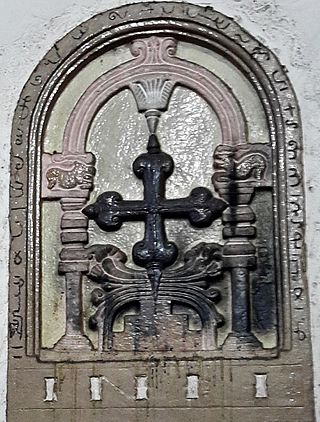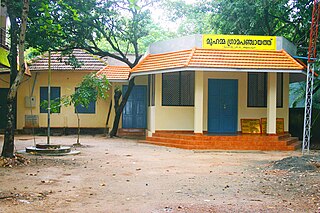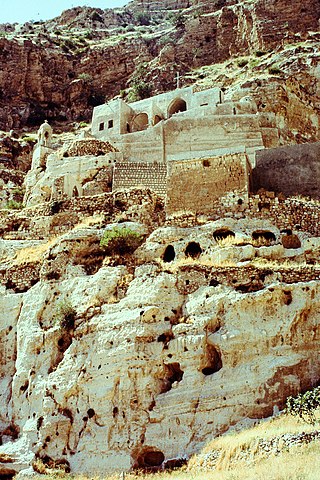Related Research Articles

Jawaharlal Nehru was an Indian anti-colonial nationalist, statesman, secular humanist, social democrat, and author who was a central figure in India during the middle of the 20th century. Nehru was a principal leader of the Indian nationalist movement in the 1930s and 1940s. Upon India's independence in 1947, he served as the country's first prime minister for 16 years. Nehru promoted parliamentary democracy, secularism, and science and technology during the 1950s, powerfully influencing India's arc as a modern nation. In international affairs, he steered India clear of the two blocs of the Cold War. A well-regarded author, his books written in prison, such as Letters from a Father to His Daughter (1929), An Autobiography (1936) and The Discovery of India (1946), have been read around the world. The honorific Pandit has been commonly applied before his name.

Indian nationalism is an instance of territorial nationalism, which is inclusive of all of the people of India, despite their diverse ethnic, linguistic and religious backgrounds. Indian nationalism can trace roots to pre-colonial India, but was fully developed during the Indian independence movement which campaigned for independence from British rule. Indian nationalism quickly rose to popularity in India through these united anti-colonial coalitions and movements. Independence movement figures like Mahatma Gandhi and Jawaharlal Nehru spearheaded the Indian nationalist movement. After Indian Independence, Nehru and his successors continued to campaign on Indian nationalism in face of border wars with both China and Pakistan. After the Indo-Pakistan War of 1971 and the Bangladesh Liberation War, Indian nationalism reached its post-independence peak. However by the 1980s, religious tensions reached a melting point and Indian nationalism sluggishly collapsed. Despite its decline and the rise of religious nationalism; Indian nationalism and its historic figures continue to strongly influence the politics of India and reflect an opposition to the sectarian strands of Hindu nationalism and Muslim nationalism.

The Chaldean Syrian Church of India is an Eastern Christian denomination, based in Thrissur, in India. It is organized as a metropolitan province of the Assyrian Church of the East, and represents traditional Christian communities of the East Syriac Rite along the Malabar Coast of India. It is headed by Mar Awgin Kuriakose.
Mahavir Tyagi was a prominent Indian independence fighter and parliamentarian from Dehra Dun, Uttar Pradesh India.

Gammiḍidala Durgabāi Deshmukh, Lady Deshmukh was an Indian freedom fighter, lawyer, social worker and politician. She was a member of the Constituent Assembly of India and of the Planning Commission of India.
The Association of Theologically Trained Women of India (ATTWI) is an association of Indian women theologians which was constituted in 1979 in Chennai.

Panchayati raj is the system of local self-government of villages in rural India as opposed to urban and suburban municipalities.
The Board of Theological Education of the Senate of Serampore College (BTESSC) is the arm of theological education under the Senate of Serampore College (University). BTESSC was formed in 1975.

Sukhadeo Thorat an Indian economist, educationist, professor and writer. He is the former chairman of the University Grants Commission. He is professor emeritus in Centre for the Study of Regional Development, Jawaharlal Nehru University. He is an expert on B. R. Ambedkar.
The National Council of Churches in India is an ecumenical forum for Protestant and Orthodox churches in India. It provides a platform for member churches and organizations to act on common issues relating to Christianity in India.

Palathinkal Varkey Cherian was a physician, surgeon and politician from India. He was the Governor of Maharashtra from 14 November 1964 to 8 November 1969.

Mar Aprem Mooken is the Metropolitan of the Assyrian Church of the East in India.

The Liturgy of Addai and Mari is the Eucharistic liturgy belonging to the East Syriac Rite and was historically used in the Church of the East of the Sasanian (Persian) Empire. This liturgy is traditionally attributed to Saint Addai and Saint Mari. It is currently in regular use in the Assyrian Church of the East of Iraq, the Ancient Church of the East of Iraq, the Syro-Malabar Church of India, and the Chaldean Catholic Church of Iraq. The latter two are Eastern Catholic churches in full communion with the Holy See of Rome.
Jetti Alfred Oliver is the present chancellor of Sam Higginbottom University of Agriculture, Technology & Sciences (SHUATS), Allahabad , which is a Govt. Aided Private (Minority) University under section 2 (f) of the University Grants Commission Act, 1956. He is an agriculturalist, with his past experience in the development sector, continues to be in the forefront of the leadership of like-minded initiatives and is an elected member of the 10-member international governing council of the Society for International Development (SID).
Tharailath Koshy Oommen is an Indian sociologist, author, teacher, and Professor Emeritus at the Centre for the Study of Social Systems, Jawaharlal Nehru University. He was awarded Padma Bhushan, the third highest Indian civilian award in 2008 for his services to the fields of education and literature by the President of India.
Bishop G. B. Devasahayam(born 23 August 1925; died 20 August 1996) was the second elected CSI-Bishop - in - Karimnagar Diocese of the Church of South India who occupied the Cathedra from 1982 through 1987 placed in the CSI-Wesley Cathedral in Karimnagar Town in Telangana, India
J. S. S. Malelu was a Banker who was Principal of the Sir Sorabji Pochkhanawala Banker's Training College, Mumbai and notable for his contribution to the Bible Society of India and the Church's Auxiliary for Social Action.
The All India Conference of Indian Christians (AICIC) is an ecumenical organisation founded in 1914 to represent the interests of Christians in India. It was founded to advocate for the moral, economic, and intellectual development of the Indian Christian community. The All India Conference of Indian Christians held its first meeting on 28 December 1914 and was led by Raja Sir Harnam Singh of Kapurthala, who was the president of the National Missionary Society (NMS); the first AICIC General Secretary was B. L. Rallia Ram of Lahore. Its creation united local and regional Indian Christian Associations, which existed in Bombay, Madras, Hyderabad, Punjab, United Provinces, Bengal and Burma, under one umbrella organisation. At the time of the Indian independence movement, the organisation allied itself with the Indian National Congress and the resolutions passed by All India Conference of Indian Christians advocated communal harmony, while also pressing for the rights of Christians in both colonial India and independent India. The India Conference of Indian Christians advocated for self-rule in a united and independent country, opposing the partition of India. During the era of the British Raj in India, the AICIC served as the mouthpiece for members of the Indian Christian community, conducting membership drives to boost its base, which included Protestant and Catholic Christians. As such, the presidents of the AICIC represented the Christians of undivided India at the Round Table Conferences.

Eliya X was Patriarch of the Church of the East from 1700 to 1722, with residence in Rabban Hormizd Monastery, near Alqosh, in modern Iraq. During his tenure, traditional ties of the Patriarchate with the remaining Christian community of the East Syriac Rite in India were re-established, and in 1708 bishop Mar Gabriel was sent there by the Patriarch, succeeding upon arrival to the Malabar Coast to revive the local East Syriac Christian community.

Shobha Nehru, commonly known as Fori Nehru and Auntie Fori, was a Hungarian-born Indian social worker and the wife of the Indian civil servant Braj Kumar Nehru of the Nehru family.
References
- ↑ ACT Alliance Members
- ↑ Mar Aprem Mooken, From Relief to Development: A Profile of CASA, Jaffe Books, 1979, p.17.
- 1 2 CASA - About us Archived 2015-10-25 at the Wayback Machine
- ↑ The National Christian Council Review, Volume 97, Wesley Press, 1977, p.139.
- ↑ H. Dwight Swartzendruber, Forty Years of Service Beyond Our Borders, Masthof Press, Morgantown, 2012.
- ↑ Harold C. Fey (Edited), A History of the Ecumenical Movement, Volume 2: 1948-1968, Wipf and Stock, Eugene, 2004, p.228.
- ↑ Somen Das, Mission Redefined' (CASA at 60 - striving towards life in fullness, Appendix C, Leadership of CASA. [ permanent dead link ]
- ↑ CASA, Our Approach to Development Archived 2015-10-25 at the Wayback Machine
- Further reading
- Thomas J. Davis (2013). Religion in Philanthropic Organizations: Family, Friend, Foe?. ISBN 9780253009975.
- H. Dwight Swartzendruber (2012). Forty Years of Service Beyond Our Borders. Masthof Press. ISBN 9781601263636.
- Somen Das (2008). "Mission Redefined' (CASA at 60 - striving towards life in fullness".
{{cite journal}}: Cite journal requires|journal=(help)[ permanent dead link ] - Damon P. Coppola (2007). Introduction to International Disaster Management. ISBN 9780080465739.
- Terry Brown (2006). Other Voices Other Worlds: The Global Church Speaks Out on Homosexuality. ISBN 9780898697933.
- Erwin Fahlbusch (1999). The Encyclopedia of Christianity. Vol. 2. ISBN 9789004116955.
- Church's Auxiliary for Social Action (1997). "From Despair to Hope: 50 Years of CASA".
{{cite journal}}: Cite journal requires|journal=(help) - Government of India (1987). "Encyclopaedia of social work in India". 4.
{{cite journal}}: Cite journal requires|journal=(help)